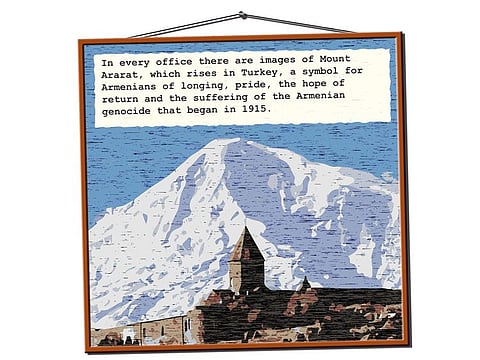Will Turkey finally recognise the Armenian genocide?
US House of Representatives has passed a resolution recognising the genocide

It has been 30 years since the fall of the Berlin Wall. A guard threw open a gate, the Soviet imperium folded, more than 100 million people in Central and Eastern Europe were freed, a divided continent was made whole, and the end of history was announced.
What to make of the three decades after Nov. 9, 1989? Poverty receded. Lives got longer. Human exchange became borderless. Artificial intelligence started making things smart. China rose, as did sea levels. The United States, attacked and wounded, tried managed decline, and at last, in wild frustration, elected Trump to its highest office. History, not terminated after all, ushered in a new wave of nationalism, nativism and xenophobia.
Water is the new oil. Data is the new plutonium. Climate is the new Armageddon. The talk in 1990 of the inevitability of a world of liberal democracy turned to predictions of a world of autocrats buttressed by the surveillance states that technology has enabled. It has proved impossible for technology companies to do no evil.
The House of Representatives, defying familiar Turkish warnings, passed a resolution recognising that genocide. Turkey, which insists there was no organised campaign to slaughter Armenians, is not Armenia’s only problemRoger Cohen
The best of all possible worlds was deferred yet again. Joachim Gauck, the Lutheran pastor and anti-Communist East German activist who later became president of a united Germany, captured the illusions and shattered hopes of 1989 best: “We dreamed of paradise and woke up in North Rhine-Westphalia.”
Of course, North Rhine-Westphalia is not bad, but in our polarised all-or-nothing political age not bad is generally not good enough. In the forgotten-words stakes, compromise rivals statesmanship.
Big things changed, and small. My lacklustre soccer club, Chelsea, got a Russian oligarch as owner and, with his billions, started winning trophies. I’d never thought the fall of Communism could so directly affect my mood. The Russians arrived — on the Cote d’Azur, on the beaches of Vietnam and, of course, in Syria. And in Armenia, the great Armenian saga of tragedy, migration, reinvention and survival took another twist.
The Soviet Union fell apart. The Republic of Armenia became an independent state in 1991. It got a tiny piece of the worst possible real estate Armenia had occupied over the millenniums of its history, but still it was something.
Armenian pride
In every office there are images of Mount Ararat, which rises in Turkey, a symbol for Armenians of longing, pride, the hope of return and the suffering of the Armenian genocide that began in 1915 and involved the Ottoman Empire’s killing of more than 1 million Armenians.
The House of Representatives, defying familiar Turkish warnings, passed a resolution recognising that genocide. Turkey, which insists there was no organised campaign to slaughter Armenians, is not Armenia’s only problem. Comrade Stalin loved to tinker with nationalities and borders.
Decades later, this caused friction between Armenia and Azerbaijan as the Soviet Union collapsed. The disputes culminated in war over the disputed Nagorno-Karabakh region a quarter-century ago. Today, Armenia’s border with Azerbaijan is closed. Its border with Turkey is closed. Only the borders with Georgia and Iran are open.
What do physical borders matter these days? The nearly 3 million citizens of Armenia are in constant touch with the many more millions of Armenians in the diaspora, who are sending money home. Armenia sees itself as a start-up country. It’s looking forward more than back.
The country’s bloodless revolution in 2018 has not delivered paradise, but it has eliminated fatalism. People feel they have the freedom to try what they want.
Weeks of mass protests against corruption and cronyism brought down the old Armenian political class, much as massive demonstrations in Beirut, Baghdad and Santiago, Chile, in recent weeks have brought down or shaken the governments of Lebanon, Iraq and Chile.
Liberal democracy is not, as Vladimir Putin has insisted, “obsolete.” It just needed a jolt.
Armen Sarkissian, the Armenian president, told me in an interview that old systems would not work. “We are living in a quantum world because more than half of life is virtual,” he said. The notion of democracies functioning through elections every few years is outdated. He called Armenia “one of the first labs” to find new “rules or behaviour” for a world where every individual has a voice that “is exercised and expressed daily.”
On the Armenian genocide, and Turkey’s denial, Sarkissian said this: “Recognition of something that you have done wrong in ordinary life, in your family, with your friends, recognition is a strength. It’s not a weakness. If you take Turkey recognising the Armenian genocide, that will also be recognition of the fact Turkey is on its way to become a tolerant state.”
One enduring lesson of 1989 is that the truth will out.
— New York Times News Service
Roger Cohen is a noted American journalist, political commentator and author.


